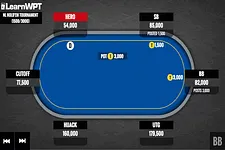Cooke's Corner: Five Major Components of Poker

What does it take to reach a top level, to be one of the few who has what it takes to succeed where others fail? It takes five major components in poker:
- Knowledge of strategy,
- Understanding your opponents' psychology,
- Understanding your own psychological make-up,
- Analytical skills, and
- Knowledge of basic statistics.
Knowledge of strategy is perhaps the simplest of the five requisite skills. You attain this two ways.
The most effective way is through experience. When playing, observe what better players do. Ask yourself why they do what they do? Spend the time between hands designing counterplays which take advantage of your opponents' tendencies. If you have trouble remembering, take notes.
Great strategy knowledge is also available through books and videos. What you should be studying depends on your knowledge and background level. The Course by Ed Miller is easy to read and good for those without math backgrounds. There are also lots of good videos and training devices out there. Check out online and find those that are a good fit for you!
Understanding your opponents' psychology means developing the ability to figure out how people think, analyzing their mood swings and being aware of their tendencies.
Many players loosen up when running well and tighten up when running badly. Other players have the opposite response. Normally aggressive players can become calling stations when they're feeling whipped. The range of human responses to triumph and adversity is incredibly varied.
Very bright people often have a problem relating to others. They tend to assume other people think like they do. This leads them to make mistakes against people who think differently.
I find a great part of my success has been the ability to work my way into people's heads and figure out how they are thinking. This comes more naturally to a "people person" than to an intellectual. Don't think about how people play — think about how they think. This is an important part of poker.
Like in life, the image people try to present can dramatically differ from the reality of what lies inside them. Dig past the outside persona into the core of the psyche. What motivates this person to put money or not put money in the pot? How much ego is involved? In time, you will develop an intuitive sense.
Understanding your own psychological make-up is almost as important. The first and most important step is a brutal self-honesty. You have to understand your own weaknesses before you can combat them. Your goal should be to develop strong character and a winning psychology. If you sit at the poker tables without doing so, you will run bad. You will find yourself outplayed. You will lose.
How do you react to adversity? Most players react emotionally. Even while presenting a stoic front, they whine and moan inside. If when you're losing you react emotionally and let it affect your play, then you should recognize this and quit your session.
It takes strength of character to analyze honestly your own level of mental toughness, but you must determine your tolerance for abuse at the table, and know when enough is enough. The very best players are not affected at all. But don't lie to yourself and pretend you're in this category if you're not. Rather, play within your emotional limits, while at the same time striving for the mental toughness that will let you shake losses and bad beats off. When you experience failure instead of giving up, find another way.
Analytical skills represent another major component in poker affecting players' success. Most players have poor analytical skills because they do not focus at the tables. As with considering your own psychological make-up, self-honesty is important here. Be objective. Don't let emotion, jealousies and especially ego interfere with your analysis.
The two tools of analysis at the poker table are inductive logic and deductive logic. You derive information by observing events and then you draw conclusions based on those observations. You use the conclusions to determine your future actions.
Finally, knowledge of basic statistics is also important. Every poker game has certain mathematical constants you should learn. These generally relate to comparing the number of cards which will make your hand to the number of cards which will make our opponent's hand, correlating these to the size of the pot, the likelihood your hand will be good if you hit, the chance you have to win without improving, the number of future bets you stand to win or lose, and so forth.
Collectively, these concepts are applied to determine whether or not you are getting the right price to justify a given poker decision — bet, call, raise, check with the intention of raising, check with the intention of calling, etc. Basic probability theory and simple addition, multiplication and division are all you need for this.
Poker is much harder than it intuitively appears. With dedication, you can become part of the small group which wins the money in poker. Develop these skills and knowledge, and you will rise to the top of the poker world.

Roy Cooke played poker professionally for 16 years prior to becoming a successful Las Vegas Real Estate Broker/Salesman. Should you wish any information about Real Estate matters — including purchase, sale or mortgage — his office number is 702-376-1515 or Roy’s email is [email protected]. His website is www.RoyCooke.com, and more of his blogs and poker tips can be found at www.RoyCookePokerlv.com. You can also find him on Facebook or Twitter @RealRoyCooke.













